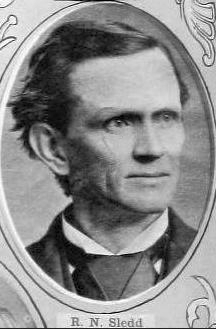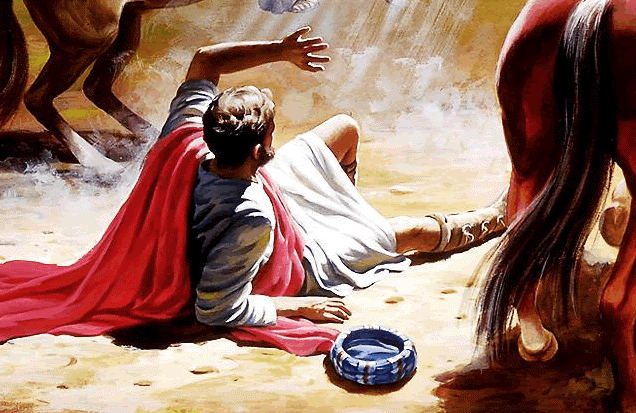Editor’s note: The following is extracted from True Heroism and Other Sermons, by R. N. Sledd (published 1899).
(Continued from: Saul, the Pharisee)
“Then was Saul certain days with the disciples which were at Damascus. And straightway he preached Christ in the synagogue, that He is the Son of God.” — Acts ix, 19, 20.
We have seen Saul, the Pharisee. He was honest in his Phariseeism. He believed in it, and loved it with all his heart. He was thoroughly imbued with its spirit. He was self-righteous, bigoted, intolerant. His intolerance broke out into violent, relentless persecution of the followers of Christ. He made havoc of the church. He arrested both men and women, shut them up in prison, and when they were brought before the Sanhedrim for trial, gave his vote against them. He aimed at nothing less than the complete extinction of the church.
Jerusalem soon became too limited a field for his active zeal. The persecution waged by him and his co-religionists resulted in the scattering of the Christians abroad. As they went they preached the word and made converts to the faith. Thus the means whereby he had hoped to extirpate the church resulted only in its enlargement. This was more than his Phariseeism, now inflamed to the highest pitch of fanaticism, could bear. He determined to follow the flying disciples and hunt them to death. With this intent he went to the high priest and obtained from him a commission to go to Damascus and arrest any of “this way” whom he might find there, and bring them bound to Jerusalem. With an escort supplied by the authorities, or companions whom he had chosen because of their sympathy with him, he set out on his journey. Five or six days’ travel brought him near Damascus. It was about mid-day as he entered the shaded avenue leading to the gates of the city. He was still “breathing out threatenings and slaughter.” No relentings had been kindled in his soul. There had been no ebbing of his hate, no faltering of his purpose to overthrow the new faith by the destruction of its adherents.
We pass over a brief period of only three days, and, strange to tell, we find him “with the disciples;” with them not as an enemy, with authority to arrest and imprison them, but as a fellow-believer and brother; and not only with them but “preaching Christ in the synagogues, that He is the Son of God.” In the very place which but three days before he expected to make the scene of violence and outrage, and in fellowship with the very persons whom he intended to make the victims of his furious zeal, he is fearlessly proclaiming the eternal power and godhead of Jesus of Nazareth, and thus setting the seal of condemnation on his countrymen and on his own past life, and attesting the truth of the faith which he came to destroy.
It is not surprising that those who “heard him were amazed, and said, Is not this he that destroyed them that called on this name in Jerusalem, and came hither for that intent?” No doubt the Jewish assemblies were profoundly moved when they heard it. Some men wondered; some wept; some gnashed their teeth in the frenzy of their disappointment; while a few, perhaps, cherished the forlorn hope that it was only a subtle strategem on his part the more surely to entrap and destroy them that believed in Christ.
The disciples themselves could scarcely believe in the reality of the change. While they “rejoiced for the deliverance,” they were bewildered by its strangeness. Could it be that the storm-cloud which had come so near had suddenly dissolved into sunshine? Was the change real, complete, and would it be permanent? Was he indeed to be henceforth their friend, and their co-laborer in the work of the world’s evangelization? These were questions of absorbing interest to them, and are of no less importance to us.
The fact of such a change of conduct is presumptive proof of a change of sentiment and conviction. When we look at his impassioned earnestness, and witness the life, spirit, and power of his words, we feel that all this is not, cannot, be assumed; that he is not acting the hypocrite; but that his conviction of the truth of what he is now proclaiming is as profound as had been his comtempt for it a few days before; and his love of Christ and His people as ardent as his hate had been cruel. And when we see that from that moment to the close of his life, despite privation, suffering, persecution, he continued “to testify the gospel of the grace of God” to both Jews and Greeks, and at last went to the scaffold for the testimony which he held, we cannot reasonably cherish the faintest doubt of the reality and completeness of the change wrought in him at Damascus.
How are we to account for this sudden change — this instantaneous renunciation of worldly name and fame, and all the convictions and prejudices of his previous life, and his consecration to a cause which he had so bitterly despised and persecuted?
Infidelity has had but few problems with which to grapple in either ancient or modern times more perplexing than this. Lord Lyttelton undertook its solution with the avowed purpose of destroying its credibility as a supernatural fact, and thus overturning one of the strong pillars of the Christian faith. Instead of accomplishing his purpose, he was himself vanquished and converted, and gave to the world as the result of his studies a powerful argument for the truth of our holy religion. Every attempt to discredit it, either as a historical or a supernatural fact, has only demonstrated the weakness of its assailants and the truth and the power of the gospel of Christ.
Let us recur to the narrative of what took place during those ever memorable three days over which we just now passed in silence. This narrative is given three times: once by Luke and twice by Saul him self — first before his countrymen at Jerusalem, and afterwards in his defence before Herod Agrippa at Caesarea. It is as follows: “And as he journeyed, he came near Damascus: and suddenly there shined round about him a light from heaven: and he fell to the earth, and heard a voice saying unto him, Saul, Saul, why persecutest thou me? And he said, who art thou, Lord? And the Lord said, I am Jesus, whom thou persecuted; it is hard for thee to kick against the pricks. And he, trembling and astonished, said, Lord, what wilt thou have me to do? And the Lord said, Arise, and go into the city, and it shall be told thee what thou must do. And the men which journeyed with him stood speechless, hearing a voice, but seeing no man. And Saul arose from the earth; and when his eyes were opened he saw no man: but they led him by the hand, and brought him to Damascus. And he was three days without sight, and did neither eat nor drink.” Ananias, divinely directed, sought him out, “and putting his hands on him said, Brother Saul, the Lord, even Jesus, that appeared unto thee in the way as thou earnest, hath sent me, that thou mightest receive thy sight, and be filled with the Holy Ghost. And immediately there fell from his eyes as it had been scales: and he received sight forthwith, and arose, and was baptized.”
Some of the opponents of Christianity reject this narrative as an unhistorical and highly colored legend. They admit that there was a change in his opinions and life, but claim that this account of it is only a creation of the exuberant oriental imagination. A very convenient method of disposing of an event wholly inexplicable from the standpoint of unbelief!
Others assume that Saul received certain impressions at the death of Stephen that unsettled his convictions. As a consequence his conscience was ill at ease; he had secret misgivings that he was persecuting the truth; and already dissatisfied with his Phariseeism, his heart was yearning for the holy triumph and rest of martyred Stephen. As he came near Damascus in this perplexed and excited state of mind, he was overtaken by a violent thunderstorm. In the flash of the lightning he imagined that he saw the face of Jesus, and in the crash of the thunder heard His voice. Thus by purely natural phenomena he is converted to Christianity!
In reply to such an interpretation it is enough to say that there is not the slightest indication that Saul’s fanaticism had lost any of its violence up to the moment of his sudden arrest under the walls of Damascus; while it is the merest trifling to contend that the magnificent superstructure of his after life and labors could have been built on the delusive fancies of a heated imagination. Infidelity does far greater violence to reason and imposes a far heavier tax on human credulity than Christian orthodoxy.
Examining this thrice told story and some of the many allusions to it in the Pauline Epistles, we are impressed with two facts:
1. Jesus personally appeared to Saul. A heavenly light, brighter than that of the sun at mid-day, suddenly shone around him, blinding and overpowering him by its splendor and prostrating him to the earth. But before his blindness and prostration he saw Jesus. It was not a dream; it was not an apparition; it was not wholly an internal revelation; it was a real, visible manifestation to his natural eyes. Ananias said to him, “Jesus, who appeared to thee.” Barnabas, introducing him to the disciples at Jerusalem, told them that “he had seen the Lord in the way.” He himself asks the question, “Have I not seen the Lord Jesus?” and enumerating the witnesses of the resurrection, he says, “and last of all He was seen of me also,” — that is, seen by him in the same sense in which He had been seen by others; so that his testimony and theirs rested on precisely the same ground — that of sight.
2. Jesus spoke to Saul — addressed him in articulate speech. He revealed to him His name, reproached him for being His persecutor, made known to him the purpose for which He appeared to him, and directed him to go into the city where he would be told what he should do. Saul thus obtained a direct, personal knowledge of Christ, and claims that in this particular he was not one whit behind those apostles who had companied with Jesus while in the flesh.
This divine manifestation wrought in him an immediate and irresistible conviction of three great truths:
1. That Jesus, though crucified, was still living. He had heard this before. Certain women and certain Galileans had testified that they had seen Him alive; and many of the Jews at Jerusalem who had not seen Him steadfastly believed that He had risen from the dead. Saul had honestly believed it a dangerous delusion, and regarded those who held it as fanatics and heretics worthy only of bonds and death. But now Jesus meets him and gives to his bodily senses a demonstration of the fact, and of the truth of their testimony, and of the blindness and folly of his conduct. So complete in his conviction of this truth — that Jesus lives — that it becomes henceforth the inspiration of his life and the principal theme of his preaching.
2. That Jesus was enthroned in divine glory. It was in the glory that He had with the Father before the world was that He appeared to Saul; and so profoundly conscious of his sovereign power did he at once become that his soul, hitherto so proud and self-sufficient, instantly bowed in humiliation and submission before Him. Jesus not only lives, but is exalted above the principalities and powers in the heavenly places, “God over all, blessed forever.” So strongly does this truth fasten itself in his mind that when he speaks to the people a few days afterwards, the divinity of Christ is the burden of his address: he preached in the synagogue that He is the Son of God. Peter, James and John could claim for Him no higher dignity that this.
3. That there is oneness of life between Jesus and His followers. “Why persecutest thou Me? Who art Thou, Lord? I am Jesus, whom thou persecutest.” He had persecuted, as he imagined, only men and women whom he regarded as apostates from the faith of the fathers, and in opposing them he believed that he was doing God service. But Jesus now confronts him with the question, “Why persecutest thou Me.” He and they are one — so one that their sufferings are His sufferings, and to persecute them is to persecute Him. What a startling revelation! Jesus, the victim of Calvary, lives and reigns in glory, and is identified with his despised followers, and will defend and save them to the uttermost, and overwhelm their adversaries with utter confusion and destruction.
When Saul turns his mind, suddenly surcharged with these great truths, back upon his own heart and life, how intense must have been his agitation of soul! In what terrific colors must his conduct have appeared, and how torturing must have been his remorse of conscience. How deep and humbling his sense of that mercy that instead of abandoning him, had met him in inexpressible tenderness and pity. “I have persecuted Him, the exalted and glorified Jesus; yet He has not met me in wrath as I deserved, but in love has arrested my erring steps and called me to Himself!” Here was grace, free, full, pitying grace, to the poor sinner. In its light he saw the magnitude of his guilt, and at the same time the length and depth and breadth and height of the grace of Christ. No wonder he became preeminently the apostle of grace and so magnified it in his preaching and in his letters to the churches.
But accompanying these revelations of truth to his mind and these stirrings of his awakened con science, there was a more vital process going forward in the inmost depths of his soul. Miraculous as was his arrest by the appearing and power of Jesus, the grandest miracle was the revelation of Jesus in the soul. So he thought and felt. When describing the event he names this as its central and most significant fact: “It pleased God to reveal His Son in me.” And that revelation was more than a demonstration to his mind of the divine glory of Jesus, and more than those convictions of the judgment and conscience that resulted from that demonstration. It was a revelation of the love of Jesus, and of the saving power of Jesus, not to him, but in him, forgiving and renewing him, and lifting him from the depths of his fall to the dignity of a new and higher life.
We hold, therefore, that his conversion was instantaneous; that he arose from the ground a changed man; in all his views and feelings and aims a new creature.
It has been said by some that his conversion was not complete until Ananias laid his hands upon him and his sight was restored; and by others, that it was completed in his baptism. If nothing more is meant than that his external profession was perfected in these ceremonies, we grant it; if on the contrary it is claimed that the internal work was in any sense dependent on them, we demur. And for reason:
1. If conversion were conditioned on the imposition of hands and baptism, then the power of spiritual life and death is at the option of the priesthood. God has never conferred such a prerogative on any man or any class of men.
2. Such an interpretation would be fatal to Paul’s claim of absolute equality with the twelve in the apostolate. They were fitted for their office and brought into it by the Lord Himself; but Saul, on this theory, must be fitted for the sacred college and brought into it under the hand of Ananias — not a presbyter or deacon, but a layman in the church.
3. Ananias said, “The Lord hath sent me that thou mightest receive thy sight, and be filled with the Holy Ghost.” Receiving his sight was a purely physical phenomenon. An examination of the places in which the expression “filled with the Holy Ghost” occurs, shows that it is almost invariably used with respect to persons who have already received Christ unto salvation. It is nowhere used as the synonym of conversion, but as expressive of a special influence and work of the Spirit at some time after regeneration. If there was any additional work accomplished in Saul, or any new grace imparted to him when Ananias laid his hands upon him, the history, so minute in its details, is entirely silent with respect to it.
No; the work was completed when Jesus met him in the way, not merely begun and left for human hands to finish. In its beginning, its progress and completion it was supernatural, wrought by the power of God the Holy Ghost.
But though supernatural, Saul himself guards us against the thought that his own will was overborne or that he had no choice in the matter. Said he, “I was not disobedient to the heavenly vision” — language plainly implying the independence of his obedience. And he never speaks of his conversion at any subsequent time except in terms that indicate the freedom of his self-determination. It was when in complete submission of soul he surrendered to the will of Christ that the mighty work was done.
On many of the particulars of this event in Saul’s life we might dwell with interest and profit. But we conclude with two reflections.
1. Its value as an argument for the truth of Christianity. The character of Saul, his early training, his discipline and devotion as a Pharisee, his inherited and cultivated and deeply seated prejudices, his honesty and fidelity to his convictions, his worldly position and prospects, his associations, all mark him as one of the last men on earth who would forsake his ancient faith. Add to this his undisguised contempt for the name of Jesus, his avowed hatred of Christianity, and his zealous efforts to exterminate the whole race of believers, and the last shadow of an antecedent presumption that he will ever become a Christian disappears. There is nothing in human nature and nothing in human history to justify an expectation of his conversion. Humanly speaking everything is against it. Yet this man is in a moment changed, completely changed — mind, heart, will, purpose, life, all changed. From the blasphemer and persecutor he becomes the humble adorer of Jesus, the boldest and mightiest preacher of the truth, the patient and joyful sufferer for its sake, and the instrument of blessing and salvation to myriads of his fellow men. If some mighty world had broken away from its orbit and dashing wildly through the universe was spreading disaster and destruction in its path, but, suddenly arrested by omnific power, was restored to its place, bound to its center and sent forward in harmony with its sister spheres on its mission of light and beauty and blessing, the miracle would have been far less astounding than such a change in such a man under such conditions. To account for it on natural principles is simply impossible. But if the gospel be true, if it be “the power of God unto salvation,” every difficulty vanishes, and we cease to wonder at its marvels of transforming and glorifying grace.
History tells us that Julian labored to destroy the church, and to cover with obloquy the name of its founder; but on his dying bed, feeling himself helpless and undone, he exclaimed “O Galilean, Thou hast conquered!” But it was a conquest of His power and not of His grace. He met Saul, his furious enemy, on the field of Damascus, and with the sword of His word laid him in the dust at His feet; and the church of the Gentiles is the monument and the Gloria of the ages in the celebration of his victory. Let this triumph and its glorious fruits be proved a myth, or
“Let every kindred, every tribe
On this terrestrial ball,
To Him all majesty ascribe,
And crown Him Lord of all.”
2. It furnishes to the world a demonstration of the greatness and sufficiency of His grace. The power that could subdue Saul, and the love that could for give him, can break the hardest heart, bring into captivity the most stubborn will, and pardon and save the chief of sinners. “Howbeit for this cause I obtained mercy,” said he, “that in me first Jesus Christ might show forth all longsuffering, for a pattern to them which should hereafter believe on Him to life everlasting.” No one can read his history and yet despair of mercy. If he, filled with madness against this way, the bloody persecutor of the saints, obtained mercy, so may I, so may all. “Now unto the King eternal, immortal, invisible, the only wise God, be honor and glory forever and ever. Amen.”










